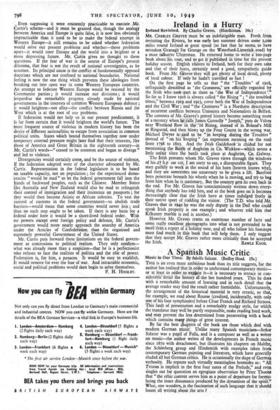A Spanish Music Critic. .....
Tuts is an even more ambitious book than its title suggests, for the author has realised that in order to understand contemporary Music— or at least in order to explain it—it is necessary to retrace in con- siderable' detail the history Of- the last hundred years. This he does with a remarkable amount of learning and in such detail that the average reader may find the result rather formidable. Unfortunately, the arrangement of the historical material is very erratic, so that, for example, we read about Rousse (credited, incidentally, with only one of his four symphonies) before Cesar Franck and Richard Strauss. This fault of presentation and a remarkably stodgy style, for which the translator may well be partly responsible, make reading hard work, and may prevent the less determined from persevering with a book which contains maw things of great interest.
By far the best Chapters of the book are those which deal with modern German music. Unlike many Spanish musicians—Senor Salazar was a pupil of Falla, and is a composer as well as a writer on music—the author writes of the developments in French music since 1870 with detachment, but illustrates his chapters on Mahler, the Schonberg group and Hindemith with examples taken from contemporary German painting and literature, which have generally eluded all but German critics. He is occasionally the dupe of German verbosity. He repeats such virtually meaningless bromides as : "All Tristan is implicit in the first four notes of the Prelude," and even singles out for quotation an egregious observation by Peter Thoene that "the ethic content serves him as a point of departure for forniu- lating the inner dissonance produced by the dynamism of the spirit." What, one wonders, is the fascination of such language that it should haunt all vvriting about the arts ?
But, generally speaking, Senor Salazar _picks his way through the Central. European labyrinth neatly. His summing up of the methods of the atonalists, polytonalists and rnicrotonalists, with their attendant advantages and disadvantages, is admirably clear and succinct. Of polytonal music he asks, pertinently, whether it is "an experiment, more or less conscious, or a work of art." And readers who have been puzzled by the music of Schonberg will be relieved to read that "the word beautiful and all that is associated with it was an idea foreign to this stage of German music. . . . To say that his [Schtinberg's] music is beautiful, ugly or even horrible . . . repre- sents a reaction as incongruous as, for, example, to say that it is high or low, blonde or brunette, green or yellow." This reveals very neatly to what extent most of us are still, after forty years, barking up the wrong tree.
The other field in which Senor Salazar excels is in his treatment of nationalism in music, and especially as found in the works of Falla, Bartok and Stravinsky. His .thapter on Stravinsky, it is true, seems to me full of special pleading, and some of his pbints are verbal rather than real. But his explanation of nationalism in music as a stage of development rather than a " school " is admirable and wholly convincing.
It is impossible for the English reader not to resent the extra- ordinary jejuneness and downright ignorance of the passages con- cerned with English music. That a book written in 1944 should mention no later work by Vaughan Williams than the Pastoral Symphony of 1922, nothing of Walton except Facade and the violin (not the viola) concerto and no work at all—not even the names—of Britten or Rawsthome is bad enough. But it is made worse by a long chapter on American music in which the veriest nonentities are allowed as much as a paragraph each. Sibelius (who is credited hopefully with eight symphonies) is represented as having been wished on to Anglo-Saxon audiFites by their music critics, and Tchaikovsky is described as the true continuer of Beethoven's Symphony." Boieldieu could not by any stretch of the imagination be called a "moat learned musician," even after Cherubini had finished with him ; and Liszt's B Minor Sonata was not a work of his "final period." These are small slips in a large work where the general standard of accuracy is high. MARTIN COOPER.



































 Previous page
Previous page